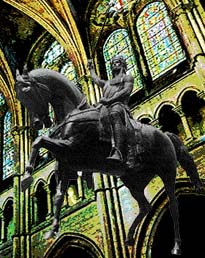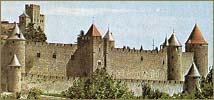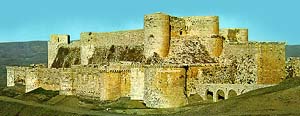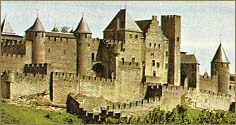|
GayHeroes.com: Gay and Lesbian People in History
|
|
The third son of Henry IIand
Elanor of Aquitane (rent the Academy Award-winning movie "Lion in
Winter" with Peter O'Toole, Katherine Hepburn, and young Anthony
Hopkins as Richard), Richard was precocious politically and militarily
and soon outstripped his brothers and even his father to obtain the
crown. Though he spent most of his time fighting with various lords and
barons, he couldn't wait to realize his one ambition: to lead a Crusade
to recapture Jerusalem from the Muslims. Displaying no concept of
planning for England, he sold everything to raise |
|
How do we know Richard was gay? "Richard was irresponsible and hot-tempered, possessed tremendous energy, and was capable of great cruelty. He was more accomplished than most of his royal family, a soldier of consummate ability, a skillful politician, and capable of inspiring loyal service. In striking contrast with his father and King John his brother, he was, there seems no doubt, a homosexual. He had no children by Queen Berengaria, with whom his relations seem to have been merely formal." -- Encyclopedia Britannica
|
 |
|
The highlighted area above, as was pointed out to me by a correspondent, is no longer on the Britannica.com website. It's been changed to this: "The evidence that he was a homosexual seems persuasive but has been strongly challenged." I wrote to Britannica to enquire about the change. They responded: Dear
Jay Spears, |
|
|
A contemporary account of Richard and King Philip of France: "They ate every day at the same table and from the same dish, and at night their beds did not separate them. And the king of France loved him as his own soul; and they loved each other so much that the king of England [Henry II, Richard's father] was absolutely astonished at the passionate love between them and marveled at it." Historians like Gillingham seem to believe that Richard & Philip sharing a bed was mere politics. If that's true, how come Richard's father was "absolutley astonished" and "marveled at it"? The author of the account is Roger of Hoveden, who served in the courts and entourages of all three kings, Henry, Richard, and Philip. His style is called rigorously impersonal (on Wikipedia). He doesn't describe the affair as "politics" but as "passionate love". What part of "passionate love" does Gillingham not understand? His claim of mere business-as-usual politics fails, and I'd venture to say he's just another historian who can't stand the thought of Richard being gay, even when a contemporary account indicates otherwise. (You wouldn't believe how many indignant Greek people write me about how Alexander the Great was not gay. Same thing here.) I'm particularly disappointed in Encyclpopedia Britannica for caving before this incredibly weak argument. LAST WORD: Encyclopedia Britannica says the evidence of Richard Lionheart's homosexuality "seems persuasive". I agree.
|
 |
"There was nothing remotely effeminate about Richard, of course, a crusader and warrior devoted to hand-to-hand combat. Another of his lovers was a young knight, a crusader, one Raife de Clermon, whom he freed from Saracen captivity. |
|
"A valiant prince, a mighty warrior, and a noble king, his character was strongly flawed by all-too-human vices. It was perhaps this very combination of great courage and great strengths with common failings that endows him with perennial appeal." -- James A. Brundage |
"Worthy, by the consent of all men, to sit with King Arthur and Roland and other heroes of martial romance at some Eternal Round Table, which we trust The Creator of the Universe in His comprehension will not have forgotten to provide." -- Winston Churchill |
![]()
|
Florence Nightingale | Tchaikovsky | Lawrence of Arabia | Gertrude Stein | Hero Form | Legends List
|
 Richard
I,
also called Richard the Lionhearted, was king of England from 1189 to
1199. His knightly manner and his prowess in the Third Crusade
(1189-92) made him a popular king in his own time as well as the hero of
Richard
I,
also called Richard the Lionhearted, was king of England from 1189 to
1199. His knightly manner and his prowess in the Third Crusade
(1189-92) made him a popular king in his own time as well as the hero of countless romantic legends.
countless romantic legends. money
and lit out for the Holy Land with his allies. The theory that a common
heathen foe would unite these brave Christian soldiers was short-lived
and they fought like, well, heathens among themselves. Richard was
brilliant in the campaign but never quite recaptured Jerusalem. At one
point he was stuck with over three thousand Muslim prisoners; not being
able to ransom or keep them, he had their throats slit! On his way home
he was shipwrecked and spent over a year imprisoned in Austria and
Germany before he was ransomed. (This imprisonment was the inspiration
for the romantic legend of the minstrel-lover finding Richard by
singing outside his prison walls, which was written a hundred years
later.) He returned to England only briefly to reassert his kingship
after his long absence, then left for France never to return,
money
and lit out for the Holy Land with his allies. The theory that a common
heathen foe would unite these brave Christian soldiers was short-lived
and they fought like, well, heathens among themselves. Richard was
brilliant in the campaign but never quite recaptured Jerusalem. At one
point he was stuck with over three thousand Muslim prisoners; not being
able to ransom or keep them, he had their throats slit! On his way home
he was shipwrecked and spent over a year imprisoned in Austria and
Germany before he was ransomed. (This imprisonment was the inspiration
for the romantic legend of the minstrel-lover finding Richard by
singing outside his prison walls, which was written a hundred years
later.) He returned to England only briefly to reassert his kingship
after his long absence, then left for France never to return, Here's
the "official document" mentioned above:
Here's
the "official document" mentioned above: Go on a
crusade with Richard the Lionhearted. Your local library is a good
place to start.
Go on a
crusade with Richard the Lionhearted. Your local library is a good
place to start.
